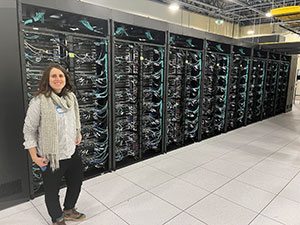UW’s De Sousa Oliveira Receives DOE Grant to Study Thermoelectric Performance
Published August 08, 2023

Thermoelectrics are a class of materials and devices that convert a temperature difference into electricity and vice versa. In other words, thermoelectrics can generate electricity from a heat source. To achieve maximum efficiency, thermoelectrics must be excellent electrical conductors but poor thermal conductors. These properties are interconnected and difficult to disentangle.
“Thermoelectric metal-organic frameworks are highly porous materials. Due to their porosity, they have extremely low thermal conductivities, a principal requirement for thermoelectric applications,” says Laura de Sousa Oliveira, a University of Wyoming assistant professor of inorganic chemistry. “By the same token, however, in addition to being thermal insulators, metal-organic frameworks tend to be electrical insulators as well. The general question we would like to answer is: Can we design metal-organic frameworks with improved electrical transport without significantly altered thermal properties?”
Her goal is to develop the fundamental knowledge to predict key quantitative structure-property relationships to inform the rational design of thermoelectric metal-organic frameworks.
To assist her to that end, de Sousa Oliveira received a U.S. Department of Energy (DOE) Early Career Research Program grant worth $874,296 over five years for her project titled “Forecasting Thermoelectric Performance in 2D Metal-Organic Frameworks Through Ab Initio Atomistic Modeling.” The grant, through DOE’s Office of Science and Established Program to Stimulate Competitive Research (EPSCoR), starts Sept. 1 and ends Aug. 31, 2028.
The Office of Science has selected 93 scientists from across the nation to receive significant funding for research as part of DOE’s Early Career Research Program, according to an Aug. 4 DOE announcement. This year’s awardees represent 47 universities and 12 national labs in 27 states. Total funding is $135 million for projects lasting up to five years, with $69 million in fiscal year 2023 dollars. Additional funding is contingent on congressional appropriations.
Funding for the awards bolsters the nation’s scientific workforce by supporting exceptional researchers at the outset of their careers, when many scientists do their most formative work. The Office of Science has a mission to deliver scientific discoveries and major scientific tools to transform understanding of nature and advance the energy, economic and national security of the U.S.
De Sousa Oliveira is the principal investigator on the project and will collaborate with colleagues at other universities who are not funded by the grant, but who are expected to be part of this research. These include Ransell D’Souza, a postdoctoral researcher at the University of Turku, in Turku, Finland, and Patrizio Graziosi, a research scientist at the National Research Council of Italy.
The research will take place at UW, with an emphasis on using the Advanced Research Computing Center on campus as well as the Derecho supercomputer at the NCAR-Wyoming Supercomputing Center in Cheyenne.
“This is all computational work,” she says. “We model these systems at the atomistic level using quantum mechanics-based approaches.”
In addition to being porous, metal-organic frameworks are very modular materials, meaning they can have a variety of topologies and be made of different moieties. Think LEGO blocks or pieces, de Sousa Oliveira says.
“On the one hand, this means that there are so many different possible combinations of pieces that some of those might just have the properties we’re looking for,” she says, citing recent research in the field suggests this to be the case. “On the other hand, it means these materials can be functionalized and tailored to myriad other applications -- gas storage, sensing, catalysis and energy storage -- so you can combine functionalities. We, thus, expect that this research will help guide the development of smart materials -- wearable devices, biomedical implants and portable electronics -- and give rise to novel applications and devices such as heat-powered sensors or catalysts.”
De Sousa Oliveira received her Ph.D. from the University of California-Riverside and her bachelor’s degree from New Mexico Institute of Mining and Technology. She was a postdoctoral researcher from 2017-2020 at the University of Warwick in Coventry, U.K.
Since its inception in 2010, the Early Career Research Program has made 868 awards, with 564 awards to university researchers and 304 awards to national lab researchers.
To be eligible for Early Career Research Program awards, a researcher must be an untenured, tenure-track assistant or associate professor at a U.S. academic institution, or a full-time employee at a DOE national laboratory who received a Ph.D. within the past 12 years.
Research topics are required to fall within the Office of Science’s eight major program areas, which are: accelerator research and development, and production; advanced scientific computing research; basic energy sciences; biological and environmental research; fusion energy sciences; high-energy physics; isotope research and development, and production; and nuclear physics.
“Supporting America’s scientists and researchers early in their careers will ensure the U.S. remains at the forefront of scientific discovery,” says Secretary of Energy Jennifer Granholm. “The funding announced today will allow the recipients the freedom to find the answers to some of the most complex questions as they establish themselves as experts in their fields.”

